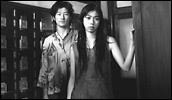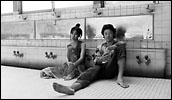Woman of Water
- Year
- 2002
- Original title
- Mizu no Onna
- Japanese title
- 水の女
- Director
- Cast
- Running time
- 115 minutes
- Published
- 1 July 2003



by Tom Mes
In Japan, it seems, any pretty face that achieves any kind of stardom, no matter how minor, will inevitably get her own photo book. Usually the main, or only, selling point of such a book is that the starlet in question bears all. Photography is always 'tastefully done' of course, but the crafty lenswork always conveniently fails to hide the fact that naked flesh is what it's all about.
With Woman of Water, this photo book aesthetic is applied to cinema. The big screen debut of pop singer UA (pronounced 'oowa'), its ambitions reach little further than capturing the petite vocalist in the buff in the most superficially artful way possible. Anything else plays a decidedly secondary role, although director Sugimori gives female viewers some respite by also having Tadanobu Asano shed his linen.
UA plays Ryo, a young woman who runs a countryside bathhouse with her father. Most appropriately, she is known among the locals as a 'water woman' due to the fact that it starts to rain every time she experiences strong emotions. One day she meets a handsome young man called Yusaku (Asano) who goes to work for her in the boiler room, where he stokes the fires that heat the bath water. Also most appropriately, and conveniently, he is an arsonist, wanted by the police. A man of fire, in other words.
And that's where director/scriptwriter Sugimori's inspiration seems to have ended. The banal, pseudo-poetic symbolism of woman/water versus man/fire is all his film has to offer in terms of substance, and it tenaciously occupies the space where there should have been a storyline. Astonishingly, Sugimori's script won the annual screenplay competition organised by the Sundance Institute and Japanese broadcaster NHK. Perhaps this can be explained less in terms of the script's qualities than in terms of Sugimori's extensive background directing TV programs for that very same NHK.
Woman of Water's ambitions remain unrelentingly superficial. Even more so than Takeshi Kitano's Dolls it emphasises pretty pictures over characterisation and storytelling any chance it gets. Against the photogenic backdrops of the bathhouse's lavish murals and the surrounding forests, we see UA playing badminton in the skimpiest of outfits, UA taking naked strolls in the rain, and UA taking baths, lots of baths. Appreciation of this obviously depends on one's attraction to the leading actress, who, to this reviewer at least, hardly represents the epitome of female splendour.
At nearly two hours in length and no respite in the shape of a decent storyline, this is cinema reduced to a moving picture book. For hardened UA and Asano gawkers only.